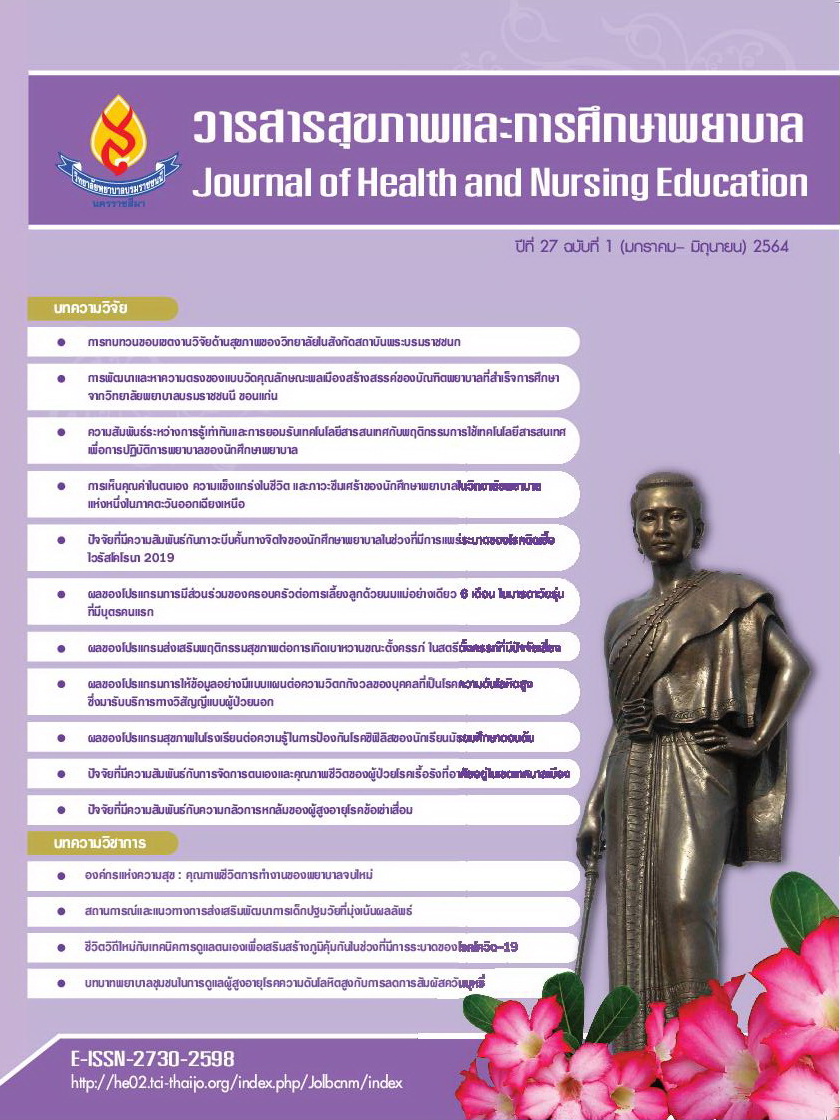ปัจจัยที่มีความสัมพันธ์กับภาวะบีบคั้นทางจิตใจของนักศึกษาพยาบาลในช่วงที่มีการแพร่ระบาดของโรคติดเชื้อไวรัสโคโรนา 2019
คำสำคัญ:
ภาวะบีบคั้นทางจิตใจ, นักศึกษาพยาบาล, โควิด-19บทคัดย่อ
การแพร่ระบาดของโรคติดเชื้อไวรัสโคโรนา 2019 (โควิด-19) ส่งผลกระทบต่อสุขภาพจิตของนักศึกษาพยาบาล การศึกษานี้มีวัตถุประสงค์เพื่อศึกษาความสัมพันธ์ระหว่างความรู้เกี่ยวกับโรคโควิด-19 การสนับสนุนทางสังคม ความวิตกกังวลต่อโรคโควิด-19 และภาวะบีบคั้นทางจิตใจของนักศึกษาพยาบาลในช่วงที่มีการระบาดของโรคในระหว่างเดือนพฤษภาคม-กรกฎาคม พ.ศ. 2563 ผู้เข้าร่วมการวิจัย คือ นักศึกษาหลักสูตรพยาบาลศาตรบัณฑิต ชั้นปีที่ 1 - 3 จากสถาบันการศึกษา 4 แห่ง จำนวน 315 คน คัดเลือกผู้เข้าร่วมการวิจัยแบบหลายขั้นตอน เก็บข้อมูลโดยใช้ แบบสอบถามข้อมูลทั่วไป แบบคัดกรองปัญหาสุขภาพจิต แบบสอบถามความวิตกกังวลต่อโรคโควิด-19 แบบสอบถามการสนับสนุนทางสังคม และแบบสอบถามความรู้เกี่ยวกับโรคโควิด-19 ค่าสัมประสิทธ์แอลฟาของครอนบากเท่ากับ .76, .81, .86 และ.72 ตามลำดับ วิเคราะห์ข้อมูลโดยใช้สถิติเชิงพรรณนาและการวิเคราะห์สหสัมพันธ์แบบสเปียร์แมน ผลการวิจัยพบว่า นักศึกษาส่วนมากมีความวิตกกังวลต่อโรคในระดับปานกลาง (ร้อยละ 60.31) และมีภาวะบีบคั้นทางจิตใจระดับสูงกว่าปกติเล็กน้อย (ร้อยละ 86.98) และพบว่าภาวะบีบคั้นทางจิตใจของนักศึกษามีความสัมพันธ์ทางลบกับความรู้เกี่ยวกับโรค (rS = -.291, p = .013) และการสนับสนุนจากเพื่อน (rS = -.193, p = .003) แต่มีความสัมพันธ์ทางบวกกับความวิตกกังวลต่อโรค (rS = .572, p = .002) แสดงว่านักศึกษาที่มีความรู้เกี่ยวกับโรคมากและได้รับการสนับสนุนจากเพื่อนจะมีภาวะบีบคั้นทางจิตใจน้อย ส่วนนักศึกษาที่มีความวิตกกังวลสูงจะมีภาวะบีบคั้นทางจิตใจสูงเช่นเดียวกัน ดังนั้นสถาบันการศึกษาควรให้ความรู้นักศึกษาเกี่ยวกับโรคและส่งเสริมการสนับสนุนช่วยเหลือกันระหว่างนักศึกษา ตลอดจนดูแลนักศึกษาที่มีความวิตกกังวลสูงเพื่อช่วยป้องกันภาวะบีบคั้นทางจิตใจ
เอกสารอ้างอิง
กระทรวงสาธารณสุข. (2563). คู่มือเจ้าหน้าที่สาธารณสุขในการตอบโต้ภาวะฉุกเฉินกรณีการระบาดโรคติดเชื้อไวรัสโคโรนา 2019 ในประเทศไทย. สืบค้นจาก https://www.skho.moph.go.th/eoc/?wpdmpro/
กระทรวงสาธารณสุข. (2564). โรคติดเชื้อไวรัสโคโรน่าสายพันธุ์ใหม่: รายงานสถานการณ์ผู้ติดเชื้อ-กรมควบคุมโรค. สืบค้นจาก https://ddc.moph.go.th/viralpneumonia/intro.php
กรมสุขภาพจิต. (2563). คู่มือการปฏิบัติงานทีมช่วยเหลือเยียวยาจิตใจทุกระดับผู้ประสบภาวะวิกฤตในกรณีการระบาดของโรคติดเชื้อไวรัสโคโรนา 2019 (COVID -19): แบบประเมินอาการวิตกกังวล. สืบค้นจาก https://www.dmh.go.th/covid19/qa/
ธนา นิลชัยโกวิทย์, จักรกฤษณ์ สุขยิ่ง, และชัชวาลย์ ศิลปกิจ. (2545). ความเชื่อถือได้และความแม่นตรงของ general health questionnaire (GHQ) ฉบับภาษาไทย. วารสารสมาคมจิตแพทย์แห่งประเทศไทย, 41(1), 2-17.
ศมนนันท์ ทัศนีย์สุวรรณ, และกิตติกร นิลมานัต. (2562). ภาวะบีบคั้นด้านจิตใจของผู้ป่วยโรคมะเร็งระหว่างรับการรักษาด้วยเคมีบำบัดและการพยาบาล. วารสารพยาบาลสงขลานครินทร์, 39(4), 110-119.
สุธิสา เต็มทับ, และกิตติกร นิลมานัต. (2560). ความสัมพันธ์ระหว่างภาวะบีบคั้นทางจิตใจกับการเผชิญความเครียดในผู้ป่วยมะเร็งตับระยะลุกลามหรือระยะท้าย: การศึกษาเชิงพรรณนาแบบตัดขวาง. สงขลานครินทร์เวชสาร, 35(4), 313-324.
Arima, M., Takamiya, Y., Furuta, A., Siriratsivawong. K., Tsuchiya. S., & Izumi, M. (2020). Factors associated with the mental health status of medical students during the COVID-19 pandemic: Across-sectional study in Japan. BMJ Open, 10(12), e043728. doi: 10.1136/bmjopen-2020-043728.
Begam, B., & Devi, K. (2020). A study to assess the perceived stress among nursing students during COVID-19 lockdown. International Journal of Science and Healthcare Research,5(4), 388-393.
Buchner, A. (2010). G*Power: Users guide – analysis by design. Retrieved from http://www.psycho.uniduesseldorf.de/abteilungen/aap/gpower3
Boonyamalik, P. (2005). Epidemiology of adolescent suicidal ideation: Roles of perceived life stress, depressive symptoms and substance use. [dissertation]. Johns Hopkins University.
Cohen, J. (1988). Statistical Power analysis for the behavioral sciences (2nded). New York: Lawrence Erlbaum Associates.
Cao, W., Fang, Z., Hou, G., Han, M., Xu, X., Dong, J., & Zheng, J. (2020). The psychological impact of the COVID-19 epidemic on college students in China. Psychiatry Research, 287(5). Retrieved from https://www.sciencedirect.com/science/article/abs/pii/S0165178120305400?via%3Dihub
Dai, Y., Hu, G., Xiong, H., Qiu, H., & Yuan, X. (2020). Psychological impact of the coronavirus disease 2019 (COVID-19) outbreak on healthcare workers in China. medRxiv preprint (6 March 2020). Retrieved from https://www.medrxiv.org/content/10.1101/2020.03.03.20030874v1
Ho, C. S., Chee, C. Y., & Ho, R. C. (2020). Mental health strategies to combat the psychological impact of COVID-19 beyond paranoia and panic. Ann Academic Medical Singapore, 49(3), 155-160.
Huda, N. (2019). Psychological distress among patients with advanced cancer: A concept analysis. Annals of Oncology, 30(5), v822-v824. doi:10.1093/annonc/mdz273
Mboya, I. B., John, B., Kibopile, E. S., Mhando, L., George, J., & Ngocho, J. S. (2020). Factors associated with mental distress among undergraduate students in northern Tanzania. BMC Psychiatry, 20(28), Retrieved from https://doi.org/10.1186/s12888-020-2448-1
Mitchell, A. E. P. (2018). Psychological distress in student nurses undertaking an educational programme with professional registration as a nurse: Their perceived barriers and facilitators in seeking psychological support. Psychiatric and Mental Health Nursing, 25(4), 258-269.
Qiu, J., Shen, B., Zhao, M., Wang, Z., Xie, B., & Xu, Y. (2020). A nationwide survey of psychological distress among Chinese people in the COVID-19 epidemic: Implications and policy recommendations. General Psychiatry, 33(e100213), Retrieved from https://gpsych.bmj.com/content/gpsych/33/2/e100213.full.pdf
Savitsky, B., Findling, Y., Ereli, A., & Hendel, T. (2020). Anxiety and coping strategies among nursing students during the covid-19 pandemic. Nurse Education in Practice, 46, 102809. Retrieved from https://doi.org/10.1016/j.nepr.2020.102809
Subba, R., Subba, S. K., Singh, J. P., & Metah, K. R. (2021). Psychological impact and coping strategies of nursing students during the outbreak of coronavirus disease in Nepal. Asian Journal of Multidisciplinary Studies, 8(9), 23-31.
Tan, B. Y., Chew, W. N., Jing, M., Yeo, L. L., Zhang, K., Ahmad, A., & Sharma, V. K. (2020). Psychological Impact of the COVID-19 pandemic on health care workers in Singapore. American College of Physicians. Retrieved from https://annals.org by guest doi:10.7326/M20-1083
Vungkhanching, M., Tonsing, J. C., & Tonsing, K. N. (2016). Psychological distress, coping and perceived social support in social work students. British Journal of Social Work, 47(3), 1999–2013.
Wang, C., Pan, R., Wan, X., Tan, Y., Xu, L., Ho, C.S., . . . Ho, R. C. (2020). Immediate psychological responses and associated factors during the Initial stage of the 2019 Coronavirus Disease (COVID-19) epidemic among the general population in China. International Journal of Environmental Research and Public Health, 17(1), 17-29. doi:10.3390/ijerph17051729
Wang, Y., Kala, M. P., & Jafar, T. H. (2020). Factors associated with psychological distress during the coronavirus disease 2019 (COVID-19) pandemic on the predominantly general population: A systematic review and meta-analysis. PLOS ONE, 15(12), e0244630. Retrieved from https://www.ncbi.nlm.nih.gov/pmc/articles/PMC7769562/pdf/pone.0244630.pdf
Watson, R., Gardiner, E., Hogston, R., Gibson, H., Stimpson, A., Wrate, R., & Deary, I. (2009). A longitudinal study of stress and psychological distress in nurses and nursing students. Journal of Clinical Nursing, 18(2), 270-278.
World Health Organization. (2021). Coronavirus disease (COVID-19) pandemic: Situation report. Retrieved from https://www.who.int/emergencies/diseases/novel-coronavirus-2019
Xiang, Y. T., Yu X., Ungvari, G. S., Correll, C. U., & Chiu, H. F. (2020). Outcomes of SARS survivors in China: Not only physical and psychiatric co-morbidities. East Asian Arch Psychiatry, 24(1), 37–38.
Yasin, M. S., & Dzulkifli, M. A. (2010). The relationship between social support and psychological problems among students. International Journal of Business and Social Science, 3(1), 110-116.
Zimet, G., Dahlem, W. N., Zimet, G. S., & Farley, G. K. (1988). The multidimensional scale of perceived social support. Journal of Personality Assessment, 52(1), 30-41.
ดาวน์โหลด
เผยแพร่แล้ว
ฉบับ
ประเภทบทความ
สัญญาอนุญาต
บทความที่ได้รับการตีพิมพ์เป็นลิขสิทธิ์ของ วารสารสุขภาพและการศึกษาพยาบาล ซึ่งดำเนินการโดยวิทยาลัยพยาบาลบรมราชชนนี นครราชสีมา
ข้อความที่ปรากฏในบทความในวารสารเล่มนี้เป็นความคิดเห็นส่วนตัวของผู้เขียนแต่ละท่านไม่เกี่ยวข้องกับกองบรรณาธิการวารสารสุขภาพและการศึกษาพยาบาล หรือวิทยาลัยพยาบาลบรมราชชนนี นครราชสีมา แต่อย่างใด ความรับผิดชอบองค์ประกอบทั้งหมดของบทความแต่ละเรื่องเป็นของผู้เขียนแต่ละท่าน หากมีความผิดพลาดใดๆ ผู้เขียนแต่ละท่านจะรับผิดชอบบทความของตนเองแต่ผู้เดียว







